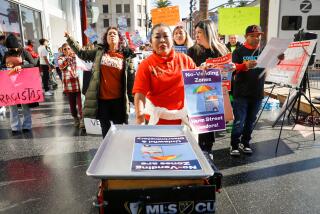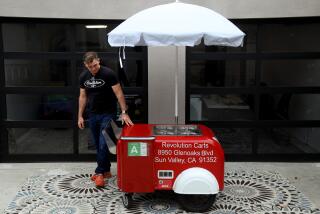L.A. street vendors fought 10 years for the right to sell. Then COVID-19 came along
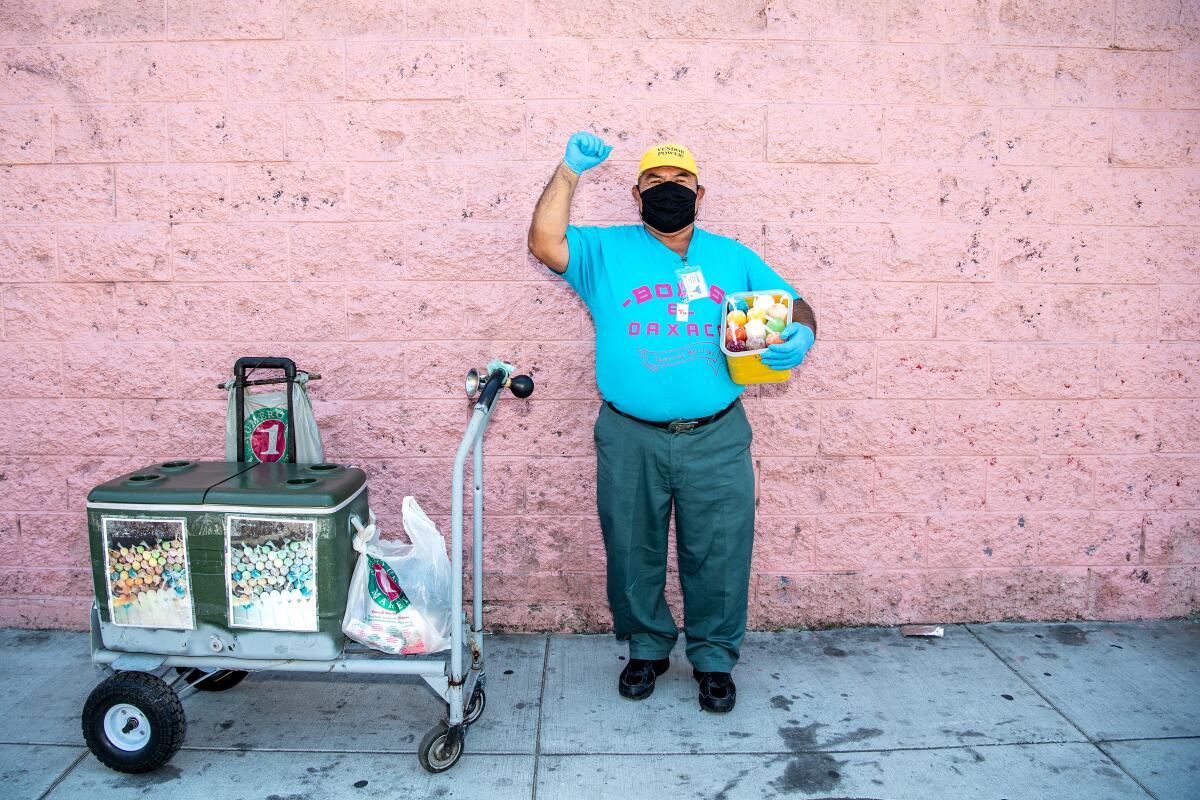
- Share via
If you live near Broadway and Vernon Avenue in South L.A., you’ve probably heard the familiar cry of Don Faustino Martinez.
“Bolis, topoyiyos, charamuscas, hielitos, congeladas, ahidil, marcianos!” the 65-year-old Martinez chants as he wheels a cooler packed with fruit-filled frozen treats up and down the neighborhood’s car-lined streets.
April would normally mark the beginning of the high season for Martinez, who has been selling homemade strawberry, coconut and tamarind ice pops from his roving street operation, Bolis El Oaxaco, since 2016.
Now, with his cart temporarily grounded due to coronavirus restrictions, the neighborhood is unnaturally quiet.
“The weather is very nice now. It’s unfortunate I can’t be out there with my customers,” Martinez said. “COVID-19 is hitting us hard. Many vendors are suffering.”
Los Angeles’ street food vendors were summarily shut down March 17 when the L.A. City Council voted unanimously to crack down on unpermitted food vendors.
“We must take preventative measures seriously and help flatten the curve on the spread of this virus,” Councilwoman Monica Rodriguez said at the daylong meeting. “It is in the public’s best interest to eliminate the congregation of people in all public spaces. Street vendors are no exception.”
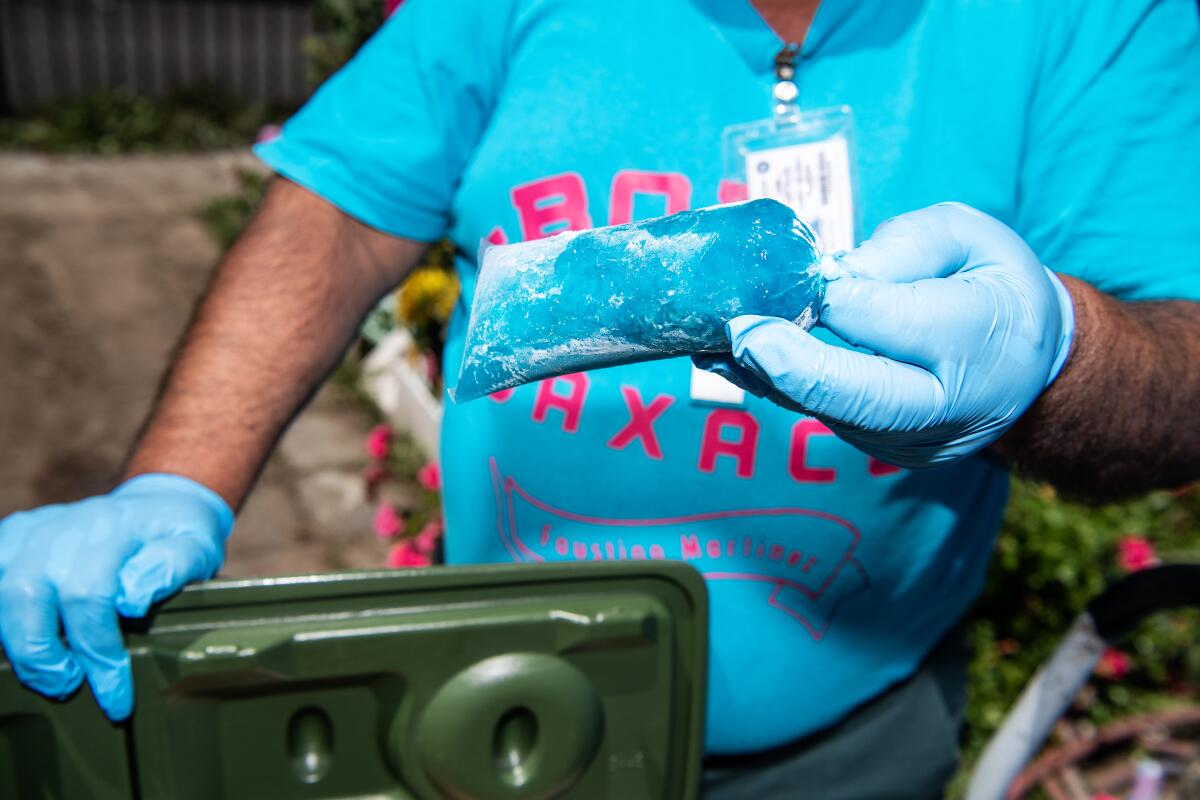
There were between 15,000 and 20,000 street vendors on city streets before the coronavirus shutdown (some estimates place the number as high as 50,000), according to the Bureau of Street Services, the division charged with overseeing sidewalk vending in L.A.
Many are undocumented workers, women and the elderly — among the most economically vulnerable groups in the city. Vendors and activists fear the coronavirus shutdown — a setback nobody saw coming — will undo the gains of a decade-long movement to decriminalize street vending in the city.
One anxious vendor is Caridad Vasquez, who has been selling food in Boyle Heights for more than a decade. Her Breed Street stand is beloved for her red pozole, enchiladas and pambazos.
Vasquez has been surviving the shutdown with help from her three adult daughters, two of whom work at restaurants.
“When I realized we couldn’t sell, I felt like the world was falling apart. I got really depressed,” she said. “It’s not that we got our hours cut back. We lost our livelihoods.”
A native of Colima, Mexico, Vasquez fled her native country to escape an abusive marriage. She set up a food stand in Boyle Heights in 2008 but was quickly shut down by law enforcement.
The pozolera-turned-activist spent more than a decade attending town halls and City Council meetings, enlisting fellow vendors and collaborating with nonprofit organizations to bring L.A.’s informal economy out of the shadows, regulate street vending practices and provide a safe way for the city’s vendors to earn a living.
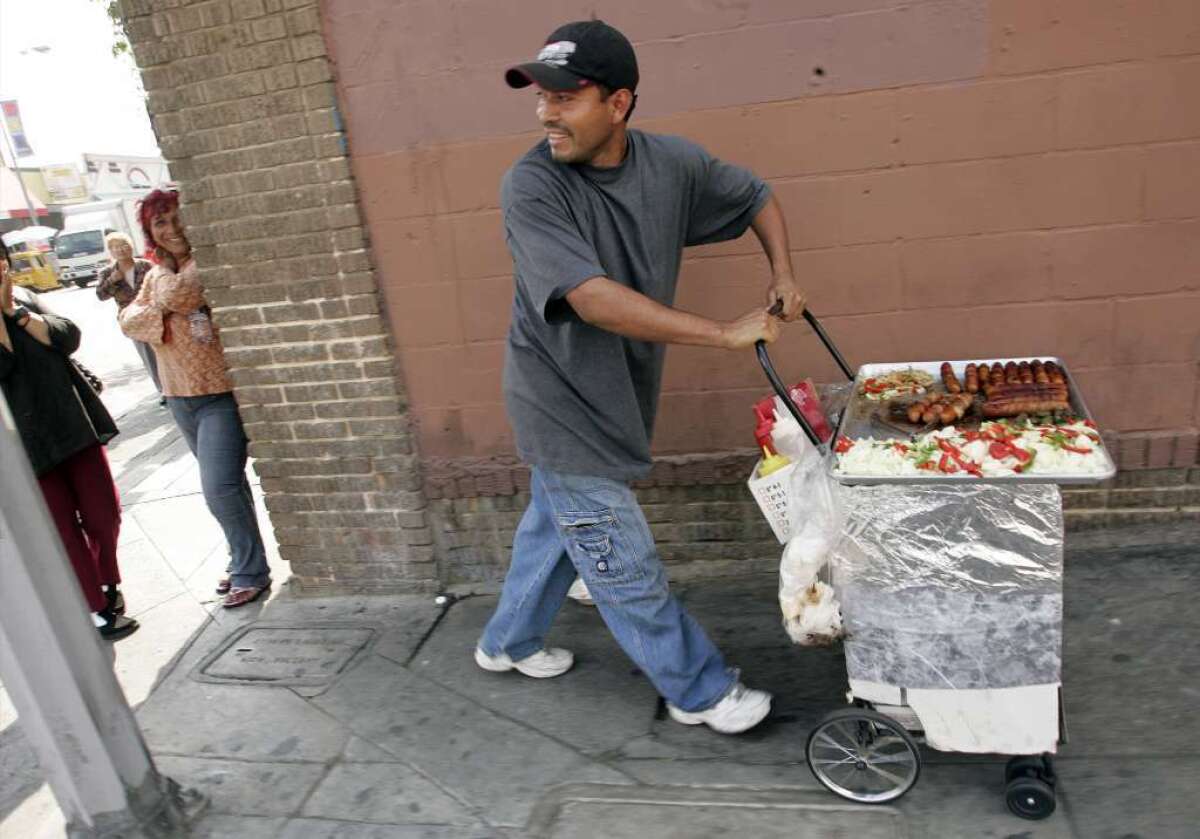
“People would tell me: ‘Doña Cari, why are you wasting your time? Nobody is going to help us.’ I didn’t think we would change the law. I just wanted to sell my food,” she said.
Over time, the coalition of street vendors and several nonprofit groups launched the Los Angeles Street Vendor campaign.
In late 2018, the campaign celebrated a major victory when then-Gov. Jerry Brown signed SB 946 into law. Known as the Safe Sidewalk Vending Act, the law was supposed to provide legal protection against the risks vendors face, which include fines, merchandise confiscation, jail time and, in some cases, deportation.
The reality has been vastly more complicated. The process of getting permitted is convoluted and expensive: Vendors must submit at least three separate applications to different government agencies. One of those agencies, the County Department of Public Health, has been a source of confusion and frustration for many vendors.
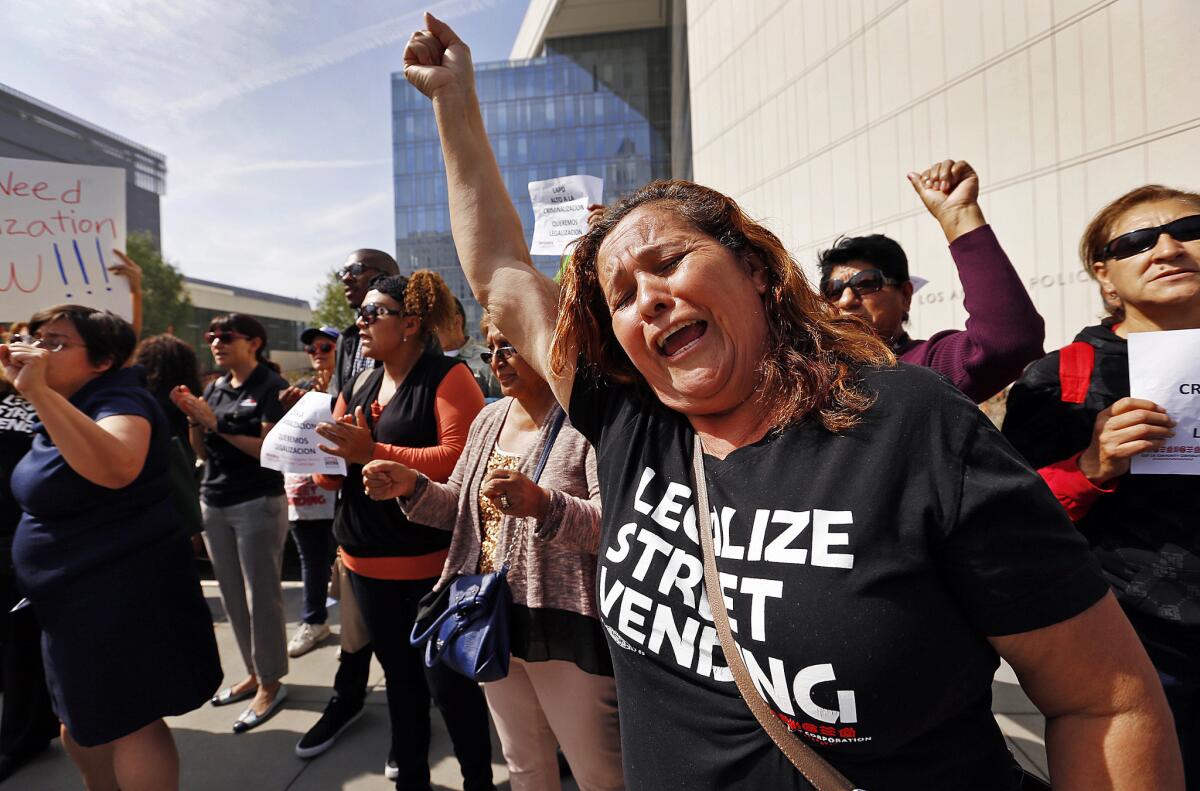
Vasquez has not been able to get a county permit, and she fears the pandemic will make it even harder.
“Those of us who sell food with the city permit are still under the threat of losing our stands because we don’t have county permits,” Vasquez said.
“We still get regularly harassed and told, ‘You don’t have the right permits.’ We need information but the authorities won’t give it to us. If we’re doing something wrong, please tell us!” she said.
“Will we be able to apply for these permits after this is all over?” she asked.
Rudy Espinoza, executive director of Inclusive Action, a nonprofit group that provides street vendors with guidance and financial support, has become a de facto expert on knotty county regulations.
The county is charged with interpreting a state retail code that is “onerous and cumbersome,” Espinoza said.
“For example, street vendors that sell whole fruit. I’ve heard stories from local agencies that have tried to help fruit sellers get a permit, and the Health Department has indicated that they simply don’t have a classification for them, so they can’t give them a permit,” Espinoza said.
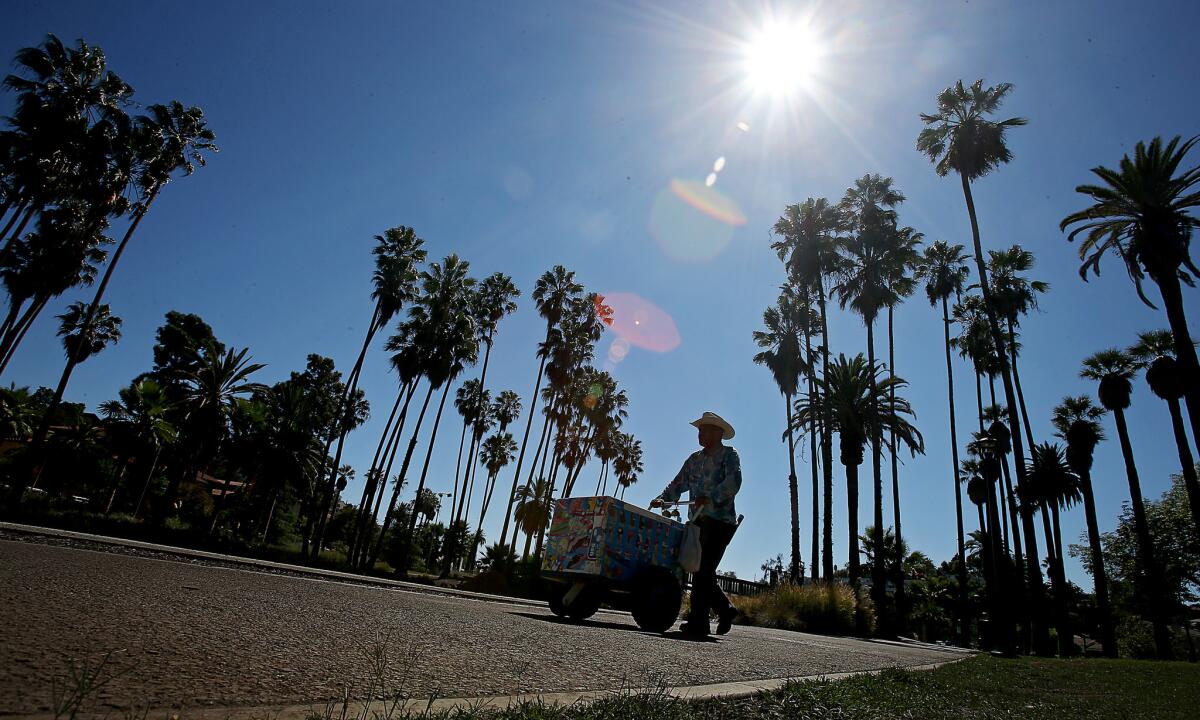
Santa Huerta, a longtime street vendor who until recently was selling clothes and toys in downtown L.A.’s Fashion District, fears the pandemic will weaken the political support the movement has gained over the years.
“We’ve been to Sacramento to try to make our leaders understand. Congressman [Ricardo] Lara helped us a lot. Some of us now have permits, but now we’re passing through this terrible pandemic and I’m not sure what will happen to us when it’s over,” said Huerta.
“We don’t have political capital. And we don’t have government help because many of us don’t have documents. Those of us who live on what we make every day — our situation is very difficult. Will anyone help us when this is all over?” she asked.
Espinoza said street vendors will require more public support to survive in a post-coronavirus landscape.
“After this is over, we want to make sure we’re still vocal with the City Council so they can take care of our people,” he said.
“It took us 10 years to get to this point. Political will was not always there,” he said. “That was one of our major concerns when they banned unlicensed vendors in March: Will it be lifted when the pandemic is over? It’s a huge fear.”
To help street vendors now, Espinoza’s group has organized an emergency fund that is providing direct cash assistance.
“Many businesses, especially food businesses, operate on a very thin margin,” he said. “Street vendors, especially undocumented workers, need cash assistance.”
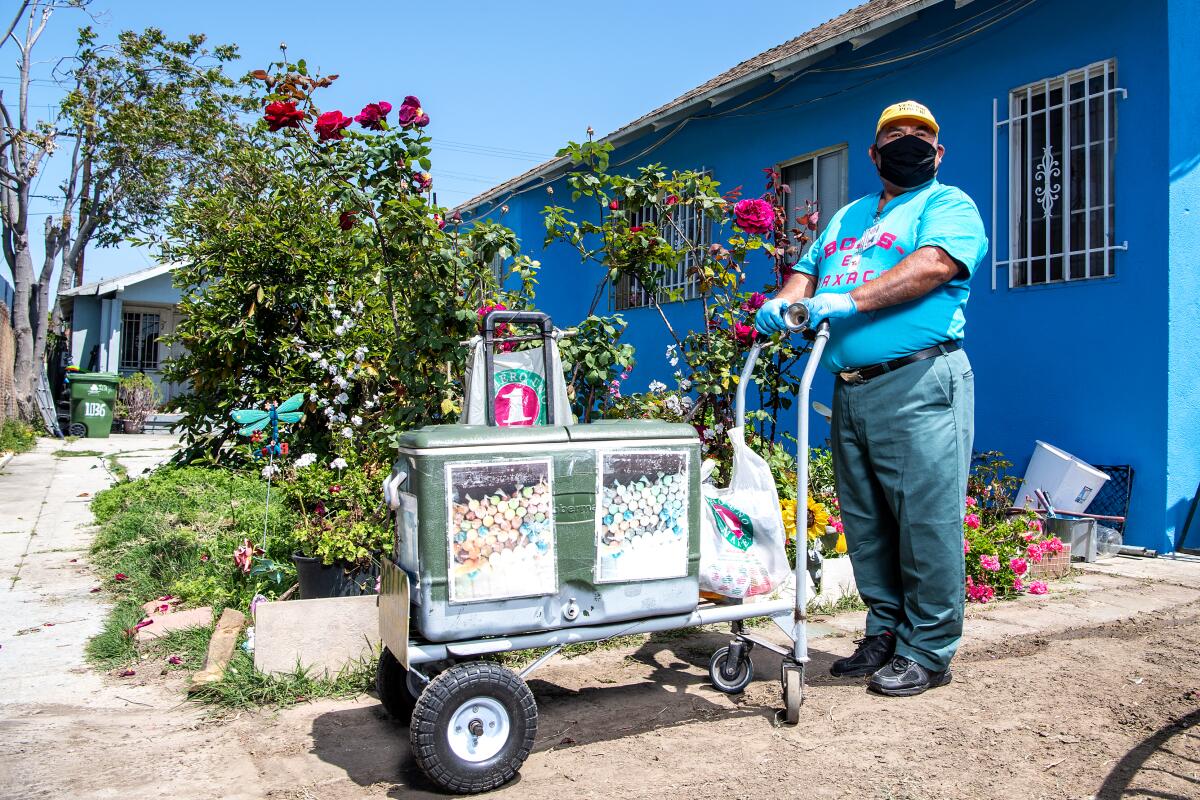
So far the Emergency Street Vendor Fund has raised a total of $236,599. The funds are being dispersed to street vendors in $400 cash grants.
Caridad Vasquez is hopeful that when coronavirus restrictions are lifted, Gov. Gavin Newsom, who recently authorized cash grants for individuals in the U.S. illegally, will support street vendors in streamlining vending permits.
“You have to understand that when a vendor goes out, it’s like the world belongs to us because we get to see the world up close,” she said. “We help keep crime down. We help watch over our communities. We feed people and pay taxes.”
Bolis salesman Faustino Martinez — known among friends for his unbreakable optimism — says that the coronavirus outbreak is no match for the leadership and strength of his fellow vendors. He is part of a newly formed group called Vendedores en Acción (Vendors in Action), or VEA. It will be a group for street vendors by street vendors, he said, to cultivate a safe, sustainable street vending culture in Los Angeles.
“I have stopped being afraid. I’m not afraid of going to the mayor’s office anymore, or going to Sacramento, or speaking in front of people,” said Martinez, who has been scraping by on takeout frozen ice cream orders from loyal customers.
“We know we have the support of many organizations and many good people,” he said. “We have gotten through so much before and we must get through this now.”
More to Read
Eat your way across L.A.
Get our weekly Tasting Notes newsletter for reviews, news and more.
You may occasionally receive promotional content from the Los Angeles Times.

